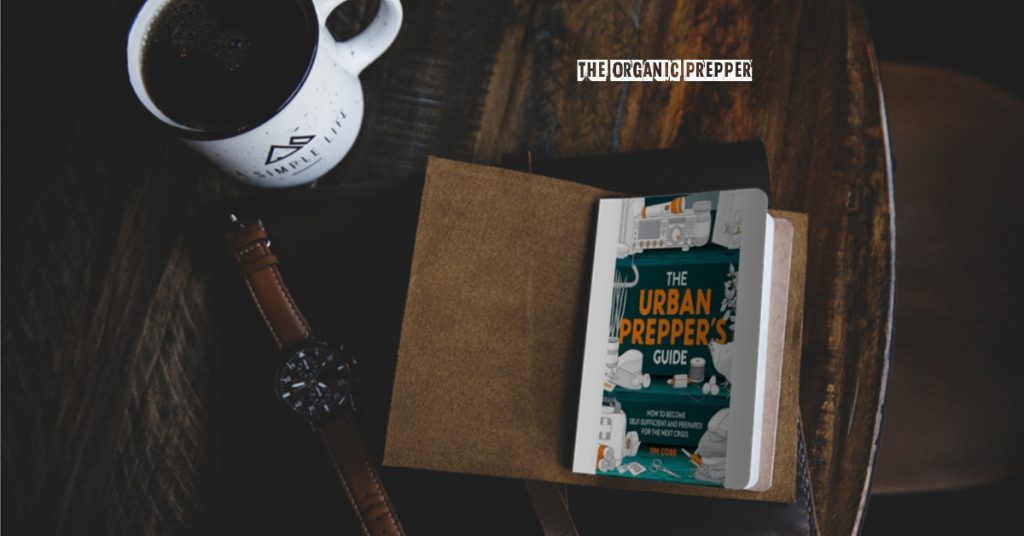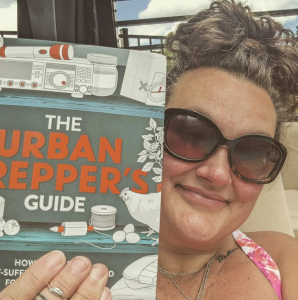If you're new here, you may want to subscribe to my RSS feed. Thanks for visiting!
Author of The Ultimate Guide to Frugal Living and the online course Bloom Where You’re Planted
One of the best books I’ve read recently was Jim Cobb’s newest: The Urban Prepper’s Guide: How to Become Self-Sufficient and Prepared for the Next Crisis. I read it poolside last summer and wanted to ponder it for a while before presenting my review.
First things first: country dwellers can also get a whole heck of a lot out of this book. Don’t be deterred by the word “urban” in the title. There’s much to learn for all of us.
With that being said, here are my thoughts.
I love the format of The Urban Prepper’s Guide.
The first thing I absolutely love about this book is the flexi-bound format. Why aren’t all prepper books made like this?
What does flexi-bound mean? The flexible cardstock is lighter weight than a traditional hardbound book, but it’s sturdier than a paperback. It’s a serious win for a book you may want to include in your bug-out bag.
Important Note: I do not have the Kindle version, but I’ve heard that the formatting in Kindle isn’t ideal, especially on your phone. I strongly recommend the physical version of this book.
What I loved about The Urban Prepper’s Guide
Jim Cobb’s books are some of the best around. He has a calm, common-sense, rational approach to prepping that is not always seen in the survival realm. There is no breathless rhetoric, no hysteria, no world-ending doom. It’s just filled with solid information that is delivered in a down-to-earth fashion. Do yourself a favor and check out all the books by Jim if you want to add to your library.
The book is loaded with actionable advice: checklists, line drawings, and how-to’s abound. It’s very much a resource that you’ll turn to again and again rather than a story-style book.
One thing this book includes that many others don’t is a debunking of urban legends and financial preparedness advice. (And who can’t use that right now?)
The reason I believe this book is for everyone, not just city dwellers, is that we can almost all relate to limited space. As well, as I get older and my kiddos have left the house, I no longer want to take care of a half-acre garden. I want to make my self-sufficiency more physically manageable wherever I happen to reside. This book is filled with ideas to become more self-reliant in less space. His advice on soft skills will be useful to anyone in any setting.
(Looking for more solid prepping advice? Check out our free QUICKSTART Guide to the four levels of disaster.)
Some stuff was geared toward beginning preppers.
One thing that is challenging when you write books in the preparedness industry is putting together a guide that works well for a wide audience. One of the criticisms I noted in the Amazon reviews is that this is a book for beginners.
It’s important to make books thorough, so in nearly any preparedness book, you’ll find the basics, and this one is no different. It’s an absolutely excellent guide for anyone who is just getting started.
Who should read this book?
While you may be put off by the inclusion of stuff for beginners, don’t let that deter you from giving this a read. Even the experienced prepper will find some truly genius ideas. Heck, I’ve written an entire book about water and still got some good ideas about water acquisition from Jim’s book.
The most important chapter in the entire book is The First 24 Hours. It’s some of the most thorough coverage I’ve seen of that vital topic, and if you only read one chapter, you’ll get your money’s worth from that one.
Check out Jim Cobb’s books.
Not only is Jim one of my favorite preparedness authors, he’s also my friend. He is a truly awesome, generous person, and he’s done so much for the preparedness community. His social media accounts are loaded with free information. Buying his books is a great way to support his work.
You will not regret getting The Urban Prepper’s Guide: How to Become Self-Sufficient and Prepared for the Next Crisis for yourself or your favorite city dweller.
Other books of Jim’s that I really enjoyed were:
- Prepper’s Longterm Survival Guide (there’s a new edition you’ve gotta read!)
- Prepper’s Home Defense and Prepper’s Armed Defense (it’s nice to see this topic covered in a way that doesn’t require an entire militia battalion)
- Prepper’s Financial Guide (especially important in these difficult economic times)
Honestly, there’s not a single book by Jim that I wouldn’t recommend.
(Want uninterrupted access to The Organic Prepper? Check out our paid-subscription newsletter.)
Have you read The Urban Prepper’s Guide?
Have you checked out The Urban Prepper’s Guide yet? What did you think? Do you have any other books by Jim Cobb you’d like to recommend?
Let’s talk about it in the comments!
About Daisy
Daisy Luther is a coffee-swigging, adventure-seeking, globe-trotting blogger. She is the founder and publisher of three websites. 1) The Organic Prepper, which is about current events, preparedness, self-reliance, and the pursuit of liberty; 2) The Frugalite, a website with thrifty tips and solutions to help people get a handle on their personal finances without feeling deprived; and 3) PreppersDailyNews.com, an aggregate site where you can find links to all the most important news for those who wish to be prepared. Her work is widely republished across alternative media and she has appeared in many interviews.
Daisy is the best-selling author of 5 traditionally published books, 12 self-published books, and runs a small digital publishing company with PDF guides, printables, and courses at SelfRelianceand Survival.com You can find her on Facebook, Pinterest, Gab, MeWe, Parler, Instagram, and Twitter.

















5 Responses
Does this book give info on how to grow food without seeds….ie potatoes, onions, garlic, avocado etc??
I didn’t mention that, but that’s a great idea for something to cover in the next edition down the road. Thanks!
Thank you for a thoughtful review, Daisy. Your comment on prepping in limited space is especially relevant to me (we just recently downsized from 4800 sf on five acres to 2500 sf on three acres).
I follow Jim Cobb on Facebook. I am impressed and appreciate his common sense approach to prepping. I think that’s really what most people want and need. I am heading over to buy a copy of his new book now.
I’ll definitely check it out. I have found the Prepper’s Blueprint an exceptional book to have in your library as well. It gives and lays out several different road maps to help someone prepare for bad situations. It truly helped me!!
I think my prepping is being hampered by uncertainty – I’m not sure what I’m preparing for.
Am I expecting Crisis, or Cruelty?
Because if I’m preparing for Crisis (even a manufactured one) then I’m looking at a Selco-type event, where things go bad fast but then recover eventually. 90 days hunkered down, and then emerge.
Whereas if I’m preparing for Cruelty (persecution due to belief or non-conformity) then I’m looking at a Jews 1938-type event, where things go bad slowly but unendingly. Surviving while preparing to flee.
I appreciate it might be both – a crisis event that then leads to persecution afterwards (especially if the crisis event can be blamed on preppers)
So………which should I be preparing for? And although many preps are common to both scenarios, which are unique to each?